Please read this blog and advise (leave a message) if you’d like VM Production consider adaptation of Uncle’s Dream– either as a period play or a contemporary story taking place in Los Angles (in the framework of our Dostoyevsky-LA Project) – see more info below. Thanks.
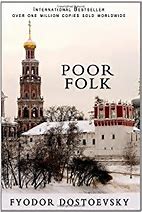 |
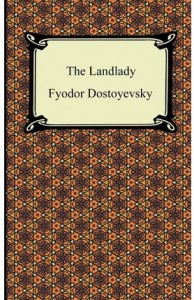 |
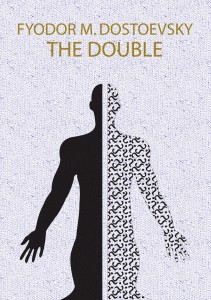 |
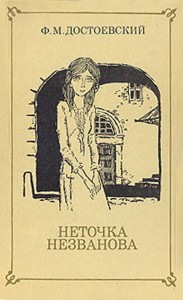 |
In 1849 Fyodor Dostoyevsky, a 27-year old writer with three novellas under his belt (Poor Folk, The Double and The Landlady), about 11 short stories including White Nights and a novel he had begun titled Netochka Nezvanova, was arrested for political activities in the Petrashevsky Circle. After a mock execution that tremendously affected his mental health, he was sentenced to four 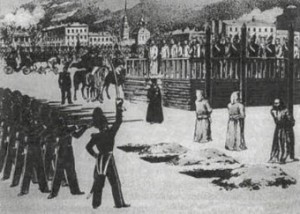 years of exile in Siberia and spent a number of years after that in military service.
years of exile in Siberia and spent a number of years after that in military service.
But while the young Fyodor had not, by any means, written his last story, he had been removed from the literary world of St. Petersburg, descending from a zenith of popularity achieved by his first novel, Poor Souls, into the nadir of the early Siberian gulags where, designated as “one of the most dangerous convicts,” he was shackled until his release. If any writers’ soul was a “poor” one, it was his.
Indeed, it would take at least three novels until Dostoyevsky had re-established himself in the world he had fallen from by the time he wrote House of the Dead, serialized between 1860 and 1862 and solidifying his return to the top.
Dostoyevsky began with a comedic approach, penning a novella titled Uncle’s Dream. Not a novel one would expect from a man fresh out of Siberia, Uncle’s Dream plays it safe in the world of provincial gossip while satirizing the higher end of provincial society to its very bones.
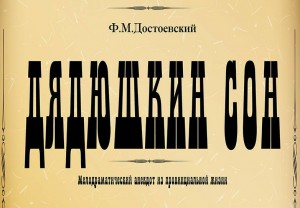 |
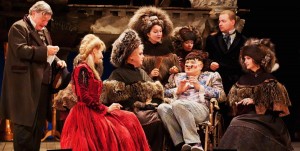 |
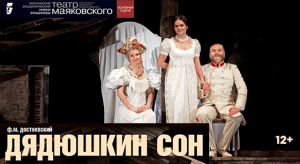 |
The story revolves around Marya Alexandrovna, the number one societal gossip in a town called Mordasov, a certain Prince K (a nod to the future Kafka?), referred to as the Prince throughout the story, and Marya Alexandrovna’s daughter, the beautiful, haughty and yet romantic Zinaida. The center of the plot is a simple one: an attempt to have Zinaida marry the Prince and thus better their family prospects. The Prince, for his part, is a senile old ex-dandy who always puts on lots of makeup, a fake wig and the like in order to look young.
The results, of course, provide for much entertainment and just as Raskolnikov fails to get away with his murder in Crime & Punishment things don’t necessarily go as planned in Uncle’s Dream either. This far into his career, however, Dostoyevsky, despite being apart from his featherpen for almost a decade, introduces the strongest developed characters he’s produced so far. Eager to get back to Saint Petersburg, his city, and the scene he’d been wrenched from, an older and wiser Fyodor returns from his exile with a message: that he’s back, and while he is content with being Mister Nice Comedian for now he is still not afraid to satirize those asking for it and that his psychological investigations are far from over.
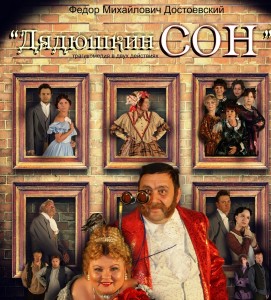 |
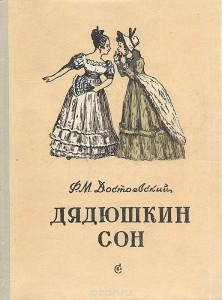 |
The tales of the great are not tales of instant success, and Uncle’s Dream was considered a failure. This story went virtually unnoticed when it came out, only receiving one review where the editor said he couldn’t finish it. Dostoyevsky himself ended up not being very fond of the story because he rushed it. Nevertheless, here are three reasons to read Uncle’s Dream:
The aforementioned character development
- Gossip – it’s here and there, it’s everywhere. Those living in small towns and villages are at its mercy, and those living in the city probably live there because their ancestors couldn’t stand their neighbors gossip back in the day. Dostoyevsky’s analysis of gossip is as deep as the self-examination of his greatest vice in The Gambler, and though it is part of the satire it is also, for the first person protagonist detailing this occurrence, a very human thing.
- Drama Outside as well as Inside – Dostoyevsky once said about his contemporary, Ivan Turgenev: “Turgenev lacks knowledge of Russian life in general. He learned about the lives of ordinary people from a serf footman he went hunting with once (A Sportsman’s Sketches), and beyond that he knew nothing.” The 19th century literary world is incomplete without its various dramas, and Uncle’s Dream was Dostoyevsky’s first attack against Turgenev in writing by resembling his play A Girl of the Provinces.
Want to know about VM Productions’ “Dostoyevsky-Los Angeles Project” and about the films we make? Want to participate in our projects? Sign up to get the tickets to the premiere of our movie in post production Dostoyevsky Reimagined-BTS and
grab our FREE e-books !
 |
 |
Follow this developing story through our social media on Twitter, Facebook, Google+, Pinterest, Tumblr, Instagram, Goodreads.

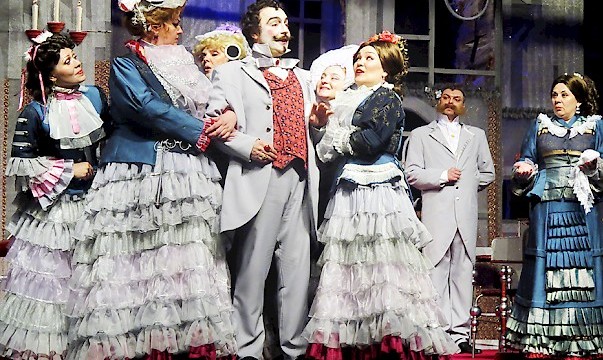






1 Comment